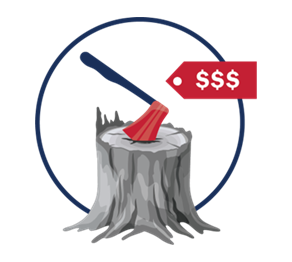Illegal logging is the most profitable natural resource crime on the planet and the third most profitable transnational crime behind counterfeiting and drug trafficking. Preventing illegal timber shipments from entering the U.S. protects American businesses from unfair competition, while cutting off a major revenue stream for transnational criminal organizations and bad actors who use profits from illegal logging to finance violent conflict, drug trafficking, wildlife trafficking, money laundering, and illegal mining.
Bad actors use the complexity of global supply chains to hide illicit activity. Corruption, transshipment, and falsification of import documents are common practices in the illegal timber trade, whether to avoid paying the proper duties on a shipment or to hide the illegal origins of unsustainably harvested wood. Criminal organizations constantly change their behavior and activity to avoid detection. Therefore, CBP uses a multi-layered, risk-based enforcement strategy to target, and penalize companies involved in timber trafficking.
CBP works with U.S. and international government agencies as well as non-government organizations to collect and develop intelligence information and to enforce environmental and natural resource trade laws. The agency leverages law enforcement technology including the Advanced Targeting System to target high risk shipments destined for the United States and to conduct physical inspections of incoming cargo at all 328 ports of entry throughout the U.S. CBP also conducts surveys and audits to determine the legality of timber imports that have already entered the U.S.
CBP works closely with the Office of the United States Trade Representative (USTR) as a participant in the U.S.-Vietnam Timber Agreement, the U.S.-Peru Trade Promotion Act Timber Committee, and the U.S-Mexico-Canada (USMCA) Interagency Environmental Committee for Monitoring and Enforcement (IECME).
These committees, their sub-committees, and working groups meet frequently to discuss enforcement options and outcomes. For example, after USTR directed blockage of illegal timber importations from Peru, CBP has enforced trade laws against illegal Peruvian timber imports through enforcement strategies in the CBP cargo environment to prevent illegal Peruvian timber entering the U.S. commerce.
CBP also participates in the interagency Illegal Logging and Associated Trade working group, where agencies such as: Homeland Security Investigations, Department of Justice, USTR, U.S. Department of Agriculture Animal and Plant Health Inspection Service (APHIS), Department of State, and the U.S. Fish and Wildlife Service collaborate on efforts to combat illegal logging and timber trafficking. CBP works with Partner Government Agencies to conduct risk and analysis survey assessments and post-entry reviews of importer records to identify potential violations.
CBP ensures compliance with U.S. trade laws by leveraging the Convention on International Trade in Endangered Species of Wild Fauna and Flora (CITES), the Lacey Act, which prohibits illegal trafficking in wildlife and plants. CBP uses numerous enforcement tools when items are determined to be in violation of these laws, such as issuing penalties under 19 USC 1595a (importations contrary to law), 19 USC 1509 (recordkeeping), and/or 19 USC 1592 (commercial fraud).



